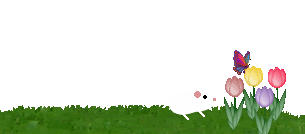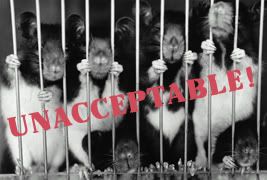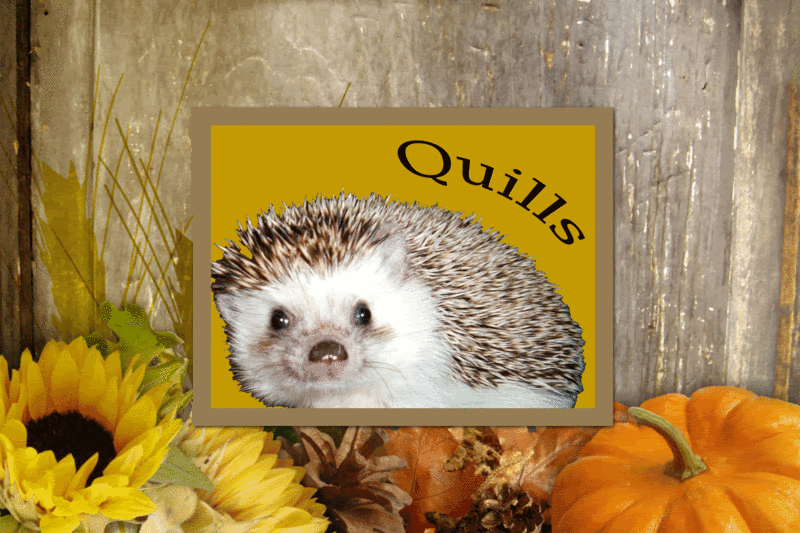Wednesday, December 27, 2006
Targeted guinea pig farm closes
John Hall

The Hall family said they would return to traditional farming
A farm that has been breeding guinea pigs for medical research for more than 30 years is to stop after intimidation by animal rights activists.
The family-run Darley Oaks Farm in Newchurch, Staffordshire, has been hit by a six-year campaign of abuse.
The owners and people connected with the firm have received death threats.
The family said they hoped the decision would prompt the return of the body of their relative Gladys Hammond, whose remains were stolen from a churchyard.
"I just feel so angry that these animal rights activists have won"
Rod Harvey, former farm supplier.
The remains were taken from her grave in nearby Yoxall in October.
Mrs Hammond, who was buried in St Peter's churchyard seven years ago, was the mother-in-law of Christopher Hall, part-owner of the farm.
In a statement, a close relative of Mrs Hammond, who declined to be named, said there was now no reason why her body could not be returned.
"Gladys was a relative of the Halls by marriage only and had no involvement in guinea pig breeding.

"She was a kind, gentle country lady who loved animals. She was also friendly, generous and loving and always put her family first."
'Fantastic day'
The Hall family have been subjected to hate mail, malicious phone calls, hoax bombs and arson attacks.
A spokeswoman for David Hall and Partners confirmed that the business, where several thousand guinea pigs are reared, was to stop breeding animals for medical research.
The Hall family is now expected to concentrate on the arable side of the business.
Gladys Hammond
The family hope that the remains of Gladys Hammond will be returned
Campaigners who have legitimately picketed the farm over recent years said they would continue their protest until the guinea pig breeding operation officially closed at the end of the year.
Johnny Holmes, a spokesman for Stop the Newchurch Guinea Pigs, said: "This is the most fantastic day of my life.
"It's a victory for the animals and it's a fundamental victory for the animal rights movement."
"Ideally, I wish they would close down today and hand them over. We want those guinea pigs out."
In a statement, the Association of British Pharmaceutical Industry (ABPI ) expressed its best wishes to the family and said their decision was "regrettable but understandable".
Director of the ABPI Philip Wright said guinea pigs had been essential in research into respiratory disease resulting in breakthroughs in the development of new medicines.
'Not a victory'
"The activities of a few animal rights extremists have placed impossible pressure on those going about their legitimate business," he said.
"While animal rights extremists are likely to be only one factor in the final decision, it does underline the need for greater protection of those individuals and companies targeted."
David Bird, from Staffordshire Police, told BBC Radio 4 it had been impossible to give complete protection because the campaign had been so widespread.
"We have had some success in dealing with those responsible. What I would say is that this closure is not a victory for anybody," he said.
Damaged sign"
 Protesters have used graffiti to get their message across
Protesters have used graffiti to get their message across"This campaign has done absolutely nothing to further the cause of animal rights."
Rod Harvey supplied fuel to the farm and endured four years of abuse from activists before he was forced to cease trading with the Halls.
The 63-year-old businessman said he received threatening letters, including one accusing him of being a paedophile which was then sent to a number of people he knew.
"In December 2003 a brick came through the window of my front door, hitting my foot and cutting my hand," he said.
"In view of what they (the Hall family) and their staff have had to put up with I'm not surprised that they have stopped breeding guinea pigs.
(I just wish I could've been the one with the spray paint and a shovel. Factory farming is wrong in any sense. Raising animals just for food, medical research, or any other research is wrong. They are devoid of social interaction and love. Prison without a crime.)

Labels: farm, Guinea pig, medical research
Monday, December 18, 2006
Vivisection Facts
"The philosophy behind vivisection, the sacrifice of creatures we regard as 'inferior' beings, differs little from that behind the concentration camp or the slave trader." Aga Khan (Prince Sadruddin) - 1933
A number count
As most governements do not require a complete figure of all animals used in experiments there is no exact number of animals used in experiments. Estimates variate from 20 to 70 million.
These are the numbers for the animals that where counted:
warm-blooded vertebrate animals used in science a year in the US is 28 million (where 18 million are killed for research).
In Canada this is 1.66 million, in the Netherlands 0.73 million.
The vast majority of the animals used (around 90%) are rats and mice specifically bred for the purpose of laboratory research.
Because rodents are not protected under current provisions of the Animal Welfare Act, specific accounting of the numbers that are used are not required by law. As a result, there is no way to know conclusively just how many millions suffer and die each year in publicly and privately funded research. Long ago, rodents became favored "laboratory" animals, not because there were compelling scientific reasons to do so, but rather for reasons of space, economy and convenience. Rodents are small animals, and more of them can be housed in a laboratory than larger animals, such as cats, dogs or monkeys. They also breed faster, and are less expensive to purchase and maintain.
About Vivisecton
Vivisection is the practice of cutting into or using invasive techniques on live animals.
The term is derived from the Latin word vivus, which means alive.
Vivisection is commonly called animal experimentation and includes the use of animals for research, product testing and in education.
Animal testing is the process in which animals are used to test the safety of cosmetics, personal care and household products.
In this form of testing, animals are forced to ingest harmful substances, or have those substances placed on their exposed skin or in their eyes.
Animal testing is conducted by companies (and by laboratories hired by those companies) on both ingredients and final products.
Alternatives to vivisection
Because of advancements in modern technology, there are safe and reliable (often more reliable, quicker and cost-effective) methods of testing products that do not need to experiment on animals while assuring the safety and well-being of the public.
Examples of alternatives are computer and mathematical models to the use of human volunteers. In vitro tests include ones that use cell or tissue cultures, such as artificial test skin derived from human foreskin. Chemical tests include the Neutral Red Bioassay that uses a neutral red, water-soluble dye that is added to normal skin cells in a tissue culture plate, and a computer measurement of the level of uptake of the dye by the cells is used to indicate the relative toxicity.
For further research please visit these sites:
http://www.navs.org/site/PageServer?pagename=index (National Anti-Vivisection Society)
http://www.aavs.org/home.html (American Anti-Vivisection Society)
http://www.neavs.org/ (New England Anti-Vivisection Society)


A number count
As most governements do not require a complete figure of all animals used in experiments there is no exact number of animals used in experiments. Estimates variate from 20 to 70 million.
These are the numbers for the animals that where counted:
warm-blooded vertebrate animals used in science a year in the US is 28 million (where 18 million are killed for research).
In Canada this is 1.66 million, in the Netherlands 0.73 million.
The vast majority of the animals used (around 90%) are rats and mice specifically bred for the purpose of laboratory research.
Because rodents are not protected under current provisions of the Animal Welfare Act, specific accounting of the numbers that are used are not required by law. As a result, there is no way to know conclusively just how many millions suffer and die each year in publicly and privately funded research. Long ago, rodents became favored "laboratory" animals, not because there were compelling scientific reasons to do so, but rather for reasons of space, economy and convenience. Rodents are small animals, and more of them can be housed in a laboratory than larger animals, such as cats, dogs or monkeys. They also breed faster, and are less expensive to purchase and maintain.
About Vivisecton
Vivisection is the practice of cutting into or using invasive techniques on live animals.
The term is derived from the Latin word vivus, which means alive.
Vivisection is commonly called animal experimentation and includes the use of animals for research, product testing and in education.
Animal testing is the process in which animals are used to test the safety of cosmetics, personal care and household products.
In this form of testing, animals are forced to ingest harmful substances, or have those substances placed on their exposed skin or in their eyes.
Animal testing is conducted by companies (and by laboratories hired by those companies) on both ingredients and final products.
Alternatives to vivisection
Because of advancements in modern technology, there are safe and reliable (often more reliable, quicker and cost-effective) methods of testing products that do not need to experiment on animals while assuring the safety and well-being of the public.
Examples of alternatives are computer and mathematical models to the use of human volunteers. In vitro tests include ones that use cell or tissue cultures, such as artificial test skin derived from human foreskin. Chemical tests include the Neutral Red Bioassay that uses a neutral red, water-soluble dye that is added to normal skin cells in a tissue culture plate, and a computer measurement of the level of uptake of the dye by the cells is used to indicate the relative toxicity.
For further research please visit these sites:
http://www.navs.org/site/PageServer?pagename=index (National Anti-Vivisection Society)
http://www.aavs.org/home.html (American Anti-Vivisection Society)
http://www.neavs.org/ (New England Anti-Vivisection Society)


Labels: experiments, medical research, mice, science, vivisection
Shabby Cheap
Origin
Rattitude
Wee Little Beasties
The Fluffy Tribe
Razzles Hog Blog
Rat in a Box
All Things Critters...Especially pet Rats
Kitty Limericks
A Hedgehog Life
Rattie Corner
Diva Kitty and the Fluffies
Vermin Realm
LOL Rats
Oh Rats!
Zing Shui
Fancy Rats
The Art of the Illustrated Rat
The Dapper Rat
You Know Your a Rat Lover When...
Farm Sanctuary
Ratz Realm Rattery
Chelsey's Cozies
January 2007
February 2007
March 2007
April 2007
May 2007
June 2007
July 2007
August 2007
September 2007
October 2007
November 2007
December 2007
January 2008
February 2008
March 2008
April 2008
May 2008
June 2008
July 2008
August 2008
September 2008
October 2008
November 2008
December 2008
January 2009
February 2009
March 2009
April 2009
May 2009
June 2009
July 2009










